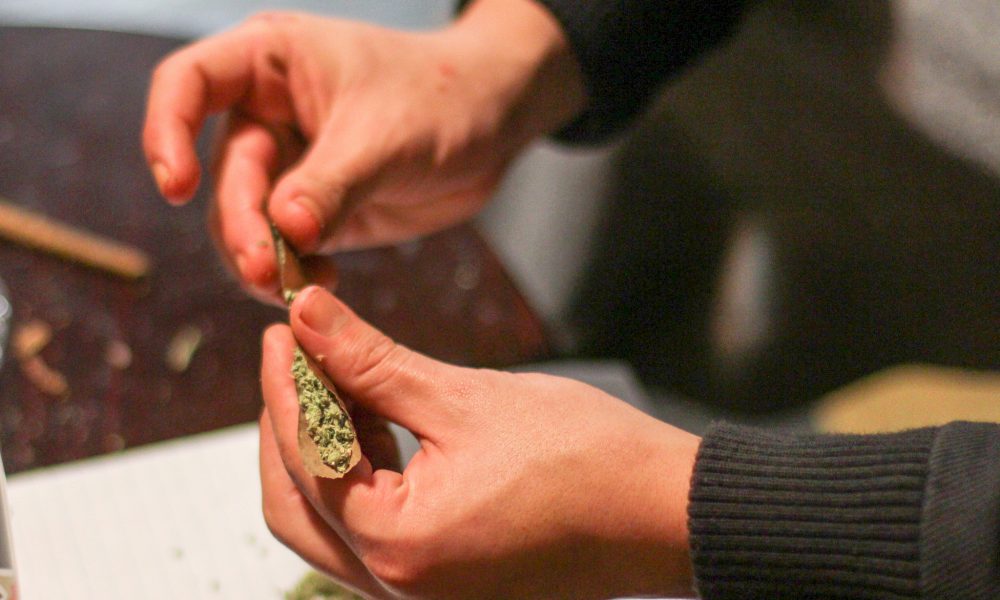A strong majority of Missouri voters, including a plurality of Republicans, support legalizing marijuana for adult use, a new poll found as activists wait for state officials to potentially verify signatures to place a reform initiative on the November ballot.
The poll from SurveyUSA asked about 2,000 registered voters in the state to weigh in on a series of political issues ranging from abortion rights to cannabis policy. It showed that 62 percent of Missourians back marijuana legalization, compared to 26 percent who said it should remain illegal.
Nearly half of those who identify as Republicans (47 percent) said that they support ending prohibition, which constitutes a plurality. Sixty-eight percent of independents and 78 percent of Democrats back the policy change.

Via SurveyUSA.
About half of those who voted for former President Donald Trump in 2020 (49 percent) said marijuana should be legalized, versus 76 percent of Biden voters.
As with past polling on the issue, younger people skewed more supportive of legalization, but a majority of every age demographic except those 65 and older said that cannabis prohibition should end.

Via SurveyUSA.
The survey—which was conducted for local TV stations in the state and involved interviews with 1,981 registered Missouri voters from July 24-27, with a +/- 2.6 percentage point margin of error—strongly signals that if marijuana legalization is placed on the ballot, it would prevail.
While the campaign Legal Missouri 2022 turned in about 400,000 signatures for a legalization initiative in May, early reporting from county officials suggests that activists may come up short in certain areas that they need to qualify. They need to reach a signature threshold in at least six of the state’s eight congressional districts to make the ballot, but it appears they are falling behind in two of those districts.
Still, John Payne of Legal Missouri recently said that the campaign remains optimistic about its chances, and activists are reviewing the results from local officials to check for errors.
“As we continue to see more signature counts submitted by counties, it’s become crystal clear that we have more than enough signatures to qualify our citizens’ initiative for the November general election ballot,” Payne said in late July. “The Legal Missouri 2022 campaign continues to work to ensure that every valid voter signature is counted properly, and is excited that Missouri voters will soon have their opportunity to decide.”
The signature count for the ballot measure won’t be finalized by the secretary of state until the August 9 deadline, so the fate of the initiative is still yet to be seen.
Payne previously led a successful ballot effort to legalize medical cannabis in the Show-Me State in 2018.
Meanwhile, some advocates and stakeholders have raised concerns about the ballot proposal and pushed for legislative reform instead, like a legalization bill from Rep. Ron Hicks (R).
—
Marijuana Moment is tracking more than 1,500 cannabis, psychedelics and drug policy bills in state legislatures and Congress this year. Patreon supporters pledging at least $25/month get access to our interactive maps, charts and hearing calendar so they don’t miss any developments.![]()
Learn more about our marijuana bill tracker and become a supporter on Patreon to get access.
—
That measure moved through the committee process this year, and there were expectations that it would reach the House floor in May, but leadership was willing to advance it before the session adjourned.
Here’s what Legal Missouri 2022’s reform initiative would accomplish:
Adults 21 and older could purchase and possess up to three ounces of cannabis.
They could also grow up to six flowering marijuana plants, six immature plants and six clones if they obtain a registration card.
The initiative would impose a six percent tax on recreational cannabis sales and use revenue to facilitate automatic expungements for people with certain non-violent marijuana offenses on their records.
Remaining revenue would go toward veterans’ healthcare, substance misuse treatment and the state’s public defender system.
The Department of Health and Senior Services would be responsible for regulating the program and issuing licenses for cannabis businesses.
Regulators would be required to issue at least 144 microbusiness licenses through a lottery system, with priority given to low-income applicants and people who have been disproportionately impacted by drug criminalization.
Existing medical marijuana dispensaries would also be first in line to start serving adult consumers with dual licenses.
Regulators could create rules around advertising, but they could not be any more stringent than existing restrictions on alcohol marketing.
Public consumption, driving under the influence of cannabis and underage marijuana use would be explicitly prohibited.
A seed-to-sale tracking system would be established for the marijuana market.
Local jurisdictions would be able to opt out of permitting cannabis microbusinesses or retailers from operating in their area if voters approve the ban at the ballot.
The measure would further codify employment protections for medical cannabis patients.
Medical marijuana cards would be valid for three years at a time, instead of one. And caregivers would be able to serve double the number of patients.
Legal Missouri 2022’s initiative is backed by the Missouri Medical Cannabis Trade Association as well as ACLU of Missouri; St. Louis City, St. Louis County and St. Charles County chapters of the NAACP; NORML KC and Missouri Association of Criminal Defense Lawyers. However, certain advocates and stakeholders have pushed back against the campaign.
Supporters of the Hicks bill, for example, have argued that the lack of specific language in the initiative prohibiting a licensing cap means the market that emerges will not be competitive. Some have also raised concerns about the measure’s provisions to give medical cannabis dispensaries a head start in serving the adult-use market.
Another Republican lawmaker in the state, Rep. Jason Chipman (R), filed a joint resolution this session that would let voters require additional oversight over how medical cannabis tax revenue is distributed to veterans.
A different campaign, Fair Access Missouri, separately explored multiple citizen initiatives this year with the hopes of getting at least one on the ballot, but did not end up submitting signatures for any of the measures.
Here’s the state of play on other drug policy ballot initiatives across the country:
Last week, Arkansas officials verified that activists turned in enough valid signatures to put a marijuana legalization initiative on the state’s November ballot.
Colorado voters will have the chance to decide on a historic ballot initiative this November to legalize psychedelics and create licensed psilocybin “healing centers” where people can use the substance for therapeutic purposes.
In May, South Dakota officials certified that activists turned in a sufficient number of signatures to qualify a marijuana legalization measure for the November ballot.
Maryland lawmakers passed legislation this year, which the governor allowed to go into effect without his signature, that will put the issue of cannabis legalization before voters this November.
North Dakota activists turned in what they believe to be enough signatures to place a marijuana legalization initiative before voters.
Oklahoma activists also said they’ve submitted what they believe to be more than enough signatures to qualify a marijuana legalization initiative for the November ballot.
Nebraska advocates recently submitted signatures for a pair of medical cannabis legalization initiatives. The campaign has faced several challenges along the way, including the loss of critical funding after a key donor passed away and a court battle of the state’s geographic requirements for ballot petitions.
An initiative to legalize marijuana will not appear on Ohio’s November ballot, the campaign behind the measure announced in May. But activists did reach a settlement with state officials in a legal challenge that will give them a chance to hit the ground running in 2023.
Michigan activists announced in June that they will no longer be pursuing a statewide psychedelics legalization ballot initiative for this year’s election and will instead focus on qualifying the measure to go before voters in 2024.
The campaign behind an effort to decriminalize drugs and expand treatment and recovery services in Washington State said in June that it has halted its push to qualify an initiative for November’s ballot.
While Wyoming activists said earlier this year that they made solid progress in collecting signatures for a pair of ballot initiatives to decriminalize marijuana possession and legalize medical cannabis, they didn’t get enough to make the 2022 ballot deadline and will be aiming for 2024 while simultaneously pushing the legislature to advance reform even sooner.
In March, California activists announced that they came up short on collecting enough signatures to qualify a measure to legalize psilocybin mushrooms for the state’s November ballot, though they aren’t giving up on a future election cycle bid.
Meanwhile, there are various local reforms that activists want to see voters decide on this November—including local marijuana decriminalization ordinances in Ohio, West Virginia and Texas.
Photo courtesy of Martin Alonso.
Medical Disclaimer:
The information provided in these blog posts is intended for general informational and educational purposes only. It is not a substitute for professional medical advice, diagnosis, or treatment. Always seek the advice of your physician or other qualified healthcare provider with any questions you may have regarding a medical condition. The use of any information provided in these blog posts is solely at your own risk. The authors and the website do not recommend or endorse any specific products, treatments, or procedures mentioned. Reliance on any information in these blog posts is solely at your own discretion.






